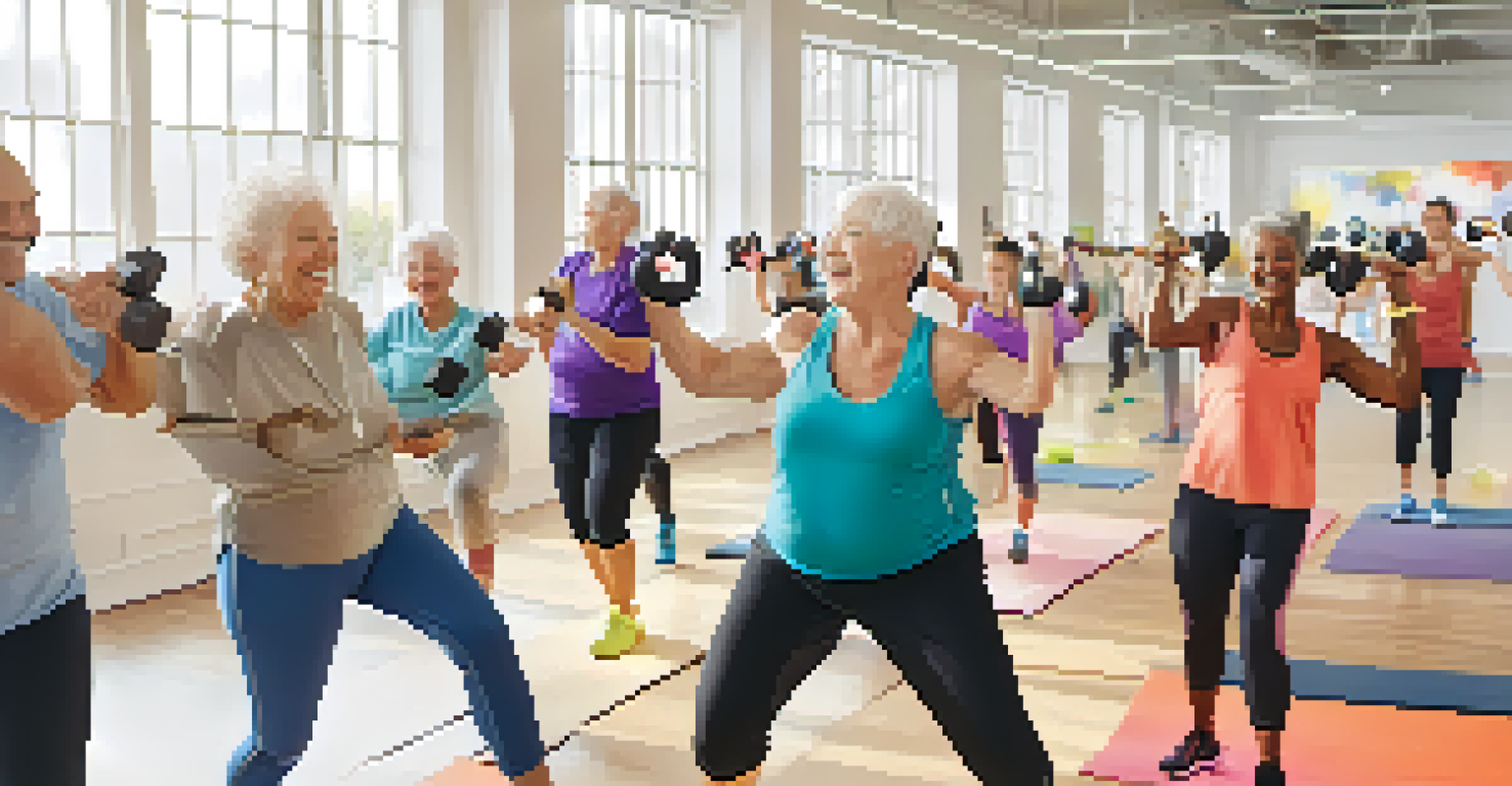Promoting Healthy Aging Through Fitness and Nutrition

Understanding Healthy Aging and Its Importance
Healthy aging is more than just avoiding illness; it involves maintaining physical, mental, and emotional well-being as we grow older. Emphasizing a holistic approach allows us to enjoy life fully, regardless of age. By understanding the significance of healthy aging, we empower ourselves to take control of our health and lifestyle choices.
Aging is not lost youth but a new stage of opportunity and strength.
Incorporating fitness and nutrition into our daily routines is a vital step towards achieving this goal. For instance, regular physical activity can reduce the risk of chronic diseases like heart disease and diabetes, while a balanced diet fuels our bodies with essential nutrients. Together, these elements create a strong foundation for longevity and vitality.
Moreover, promoting healthy aging is not limited to older adults; it's something we can start at any age. By adopting healthier habits early on, we can significantly improve our quality of life as we age, making the journey more enjoyable and fulfilling.
The Role of Regular Exercise in Aging Gracefully
Exercise plays a crucial role in maintaining physical health as we age. It helps improve strength, flexibility, and cardiovascular health, making everyday activities easier and more enjoyable. Think of exercise as a key that unlocks a more active and independent lifestyle, allowing us to continue doing what we love.

Engaging in activities like walking, swimming, or yoga can also boost mental health by reducing symptoms of anxiety and depression. The endorphins released during exercise act as natural mood lifters, promoting a sense of well-being. This mental boost is especially important as we navigate life’s changes in our later years.
Holistic Approach to Aging
Healthy aging encompasses physical, mental, and emotional well-being, empowering individuals to enjoy life at any age.
Additionally, social connections fostered through group exercises can combat feelings of loneliness and isolation. Joining a local fitness class or walking group not only benefits our physical health but also strengthens our social bonds, creating a supportive community that encourages healthy aging.
Nutrition: The Foundation of Healthy Aging
Nutrition is a cornerstone of healthy aging, providing the body with essential nutrients that support overall health. A balanced diet rich in fruits, vegetables, whole grains, and lean proteins can help prevent age-related diseases and maintain energy levels. Imagine your body as a car; just like it needs high-quality fuel to run smoothly, our bodies require proper nutrition to function optimally.
The secret to aging gracefully is to be active, eat well, and embrace life's joys.
As we age, our nutritional needs may change, making it vital to adjust our diets accordingly. For instance, older adults often need more calcium and vitamin D to support bone health. Consulting with a healthcare professional or nutritionist can help tailor a diet that meets individual needs and preferences.
Hydration is another crucial aspect often overlooked in nutrition. Drinking enough water aids digestion, absorption of nutrients, and overall bodily functions. Remember, staying hydrated is like keeping the engine cool; it helps everything run more efficiently.
Incorporating Mindfulness into Nutrition Choices
Mindful eating is an approach that encourages us to pay attention to our food choices and eating habits. It involves savoring each bite, recognizing hunger cues, and appreciating the nutritional value of our meals. By practicing mindfulness, we can develop a healthier relationship with food, reducing the tendency to overeat or choose unhealthy options.
For example, taking the time to enjoy a meal without distractions—like television or smartphones—can enhance our dining experience. This not only allows us to appreciate the flavors and textures but also helps in recognizing when we are satisfied. It’s a simple shift that can lead to significant health benefits.
Importance of Social Support
Strong social connections enhance mental and physical health, providing motivation and reducing feelings of loneliness as we age.
Moreover, mindfulness can extend beyond just eating. Being aware of how different foods make us feel can guide us in making healthier choices. Over time, this practice can contribute to better nutrition and overall well-being as we age.
Strength Training for Longevity
Strength training is often overlooked in discussions about aging, yet it is incredibly important for maintaining muscle mass and bone density. As we age, we naturally lose muscle, which can lead to decreased mobility and increased risk of falls. Incorporating resistance exercises into your routine is like giving your body a tune-up, helping to keep everything in working order.
Simple activities like weight lifting, bodyweight exercises, or resistance band workouts can make a big difference. Even small amounts of strength training can improve balance, coordination, and overall physical function. Think of it as building a strong foundation; the sturdier it is, the more it can withstand the test of time.
Additionally, strength training can boost metabolic health, making it easier to maintain a healthy weight. This can further reduce the risk of chronic diseases, illustrating how one aspect of fitness can have widespread benefits for healthy aging.
The Benefits of Social Support in Healthy Aging
Social support is a vital component of healthy aging, as it can significantly impact both mental and physical health. Engaging with friends, family, and community members can provide emotional strength and motivation to maintain a healthy lifestyle. Think of social interactions as the sunshine in your garden; they help nourish your growth and well-being.
Participating in group fitness classes or community meals can foster a sense of belonging and accountability. When we surround ourselves with others who share similar goals, we’re often more motivated to stick with our fitness and nutrition plans. This camaraderie can transform healthy habits into a fun and rewarding part of our lives.
Setting Achievable Goals
Establishing realistic and manageable goals fosters progress and motivation, making healthy aging more attainable.
Moreover, strong social networks can help combat feelings of loneliness and depression that may arise as we age. By nurturing these connections, we not only enhance our quality of life but also create a supportive environment that encourages healthy choices.
Setting Realistic Goals for Healthy Aging
Setting realistic and achievable goals is essential for promoting healthy aging. Instead of aiming for drastic changes, start small and build on your successes over time. This could mean incorporating a 20-minute walk into your day or trying a new healthy recipe each week. Think of it as climbing a staircase; one step at a time gets you to the top.
By breaking down larger objectives into manageable tasks, we can avoid feeling overwhelmed and more easily track our progress. Celebrating these small victories keeps us motivated and reinforces our commitment to fitness and nutrition. Plus, it’s a reminder that every effort counts, no matter how small.

Lastly, remember that it’s okay to adjust your goals as needed. Life can be unpredictable, and being flexible allows you to adapt to changing circumstances. Embracing this mindset can help you stay on the path toward healthy aging, no matter what challenges arise.